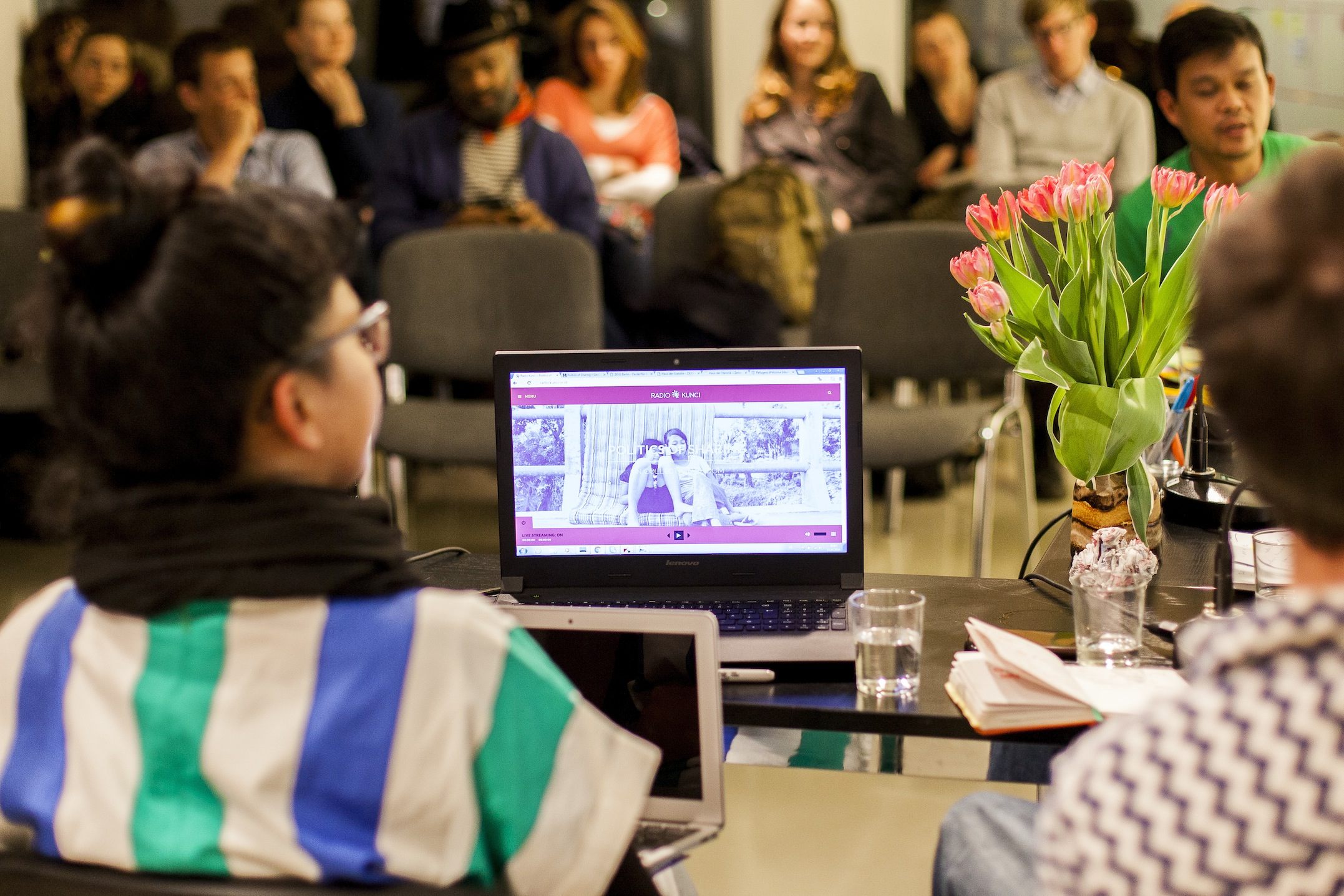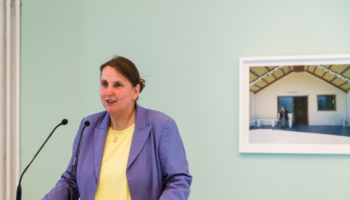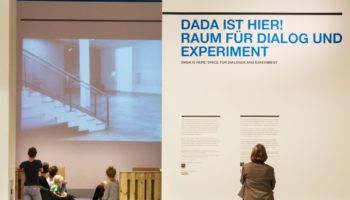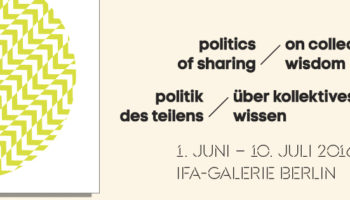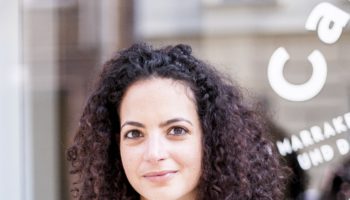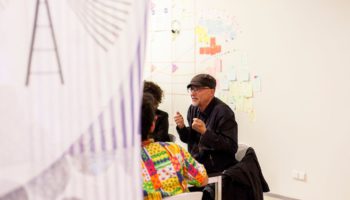–English version please scroll down–
„Sind wir bereit zu teilen? Sind wir in der Lage zu teilen?“ Gleich zur Begrüßung stellte Elke aus dem Moore diese Frage in den Raum. Die Leiterin der Abteilung Kunst des Instituts für Auslandsbeziehungen (ifa) eröffnete am 14. April 2016 in der ifa-Galerie Berlin die Veranstaltungsreihe „Politik des Teilens – Über kollektives Wissen“. Zum Auftakt wird das Thema „Sich eine Heimat fern der Heimat schaffen“ behandelt. Bis zum 14. Mai wird das ifa die Räume in der Linienstraße dem Kollektiv KUNCI Cultural Studies Center aus Yogyakarta zur Verfügung stellen. So ist genaugenommen aus dem Moore selbst nur ein Gast in der eigenen Institution.
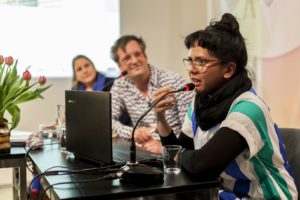
Warum aber verwandelt sich eine Galerie in eine Radiostation? Wegen „Numpang“. Das Wort mit dem freundlichen Klang bezeichnet eine indonesische Praxis des Teilens von Raum, Ort und Zeit. Das kann eine Mitfahrgelegenheit sein, eine temporäre Unterkunft oder die Nutzung des öffentlichen Raums. Immer ist es eine Maßnahme, die das Einverständnis anderer erfordert. Und von der im besten Falle beide Seiten auf bisweilen nicht voraussehbare Weise profitieren können. „Ein sensibler Austausch nicht nur von Geld, sondern auch von Zeit und Herzlichkeit“, erklärte Syafiatudina, Moderatorin von KUNCI. So hat Numpang nun auch in Berlin Einzug gehalten, wo Syafiatudina am Eingangsabend Philip Horst vom Zentrum für Kunst und Urbanistik (ZK/U) in Berlin und den Stadtforscher Sinthujan Varatharajah, einen Vertreter der europaweiten „Initiative Flüchtlinge Willkommen“ zu einer Sendung im Online Radio KUNCI eingeladen hatte.
Kollektiv der Querdenker
Eingangs stellte Syafiatudina das Kollektiv KUNCI vor, eine Vereinigung von Künstlern, Schriftstellern und Denkern, das 1999 als Studenteninitiative gestartet hatte. „Unser Ziel ist es, eine kritische Gesellschaft zu schaffen“, erklärte sie. KUNCI würde immer vorgeworfen „in between“ den Künsten und der Wissenschaft zu stehen. „Doch wir genießen es, zwischen den Bereichen zu switchen und Themen querzudenken“, erklärte die indonesische Kuratorin.

Ebenfalls ein Kollektiv bildet das 2012 im ehemaligen Güterbahnhof Moabit eröffnete ZK/U, das aus dem Künstlerkollektiv KUNSTrePUBLIK hervorgegangen ist. Dank eines Erbpachtvertrags ist es gelungen, einen langfristigen Standort für öffentliche Veranstaltungen und Forschungsresidenzen zu eröffnen. Der Güterbahnhof soll nun als Umschlagplatz zeitgenössischer postindustrieller Werte fungieren. Dort gibt es etwa einen gemeinsamen Kochtag, an dem die Künstler ihre Projekte vorstellen und einmal im Monat einen Tag der offenen Tür. Doch umso institutioneller das ZK/U geworden sei, umso nötiger sei auch ein Reglement vor allem in Sachen Sauberkeit und dem Schutz individuellen Eigentums, räumte Horst ein. Aktuell ist das ZK/U an der Initiative „Haus der Statistik“ am Alexanderplatz beteiligt. Neben Künstlerateliers, bezahlbaren Apartments und Flüchtlingsunterkünften solle sich hier – mitten in der City – ein Zentrum für Kultur und Bildung etablieren. Das Haus der Statistik, ehemaliger Sitz der Gauck-Behörde, steht seit acht Jahren leer.
Flüchtlinge willkommen
Um das Zusammenleben mit Geflüchteten geht es in dem Projekt „Initiative Flüchtlinge Willkommen“. Über eine digitale Plattform werden Zimmer in Wohngemeinschaften an Menschen vermittelt, die ihre Heimat verloren haben. „Für uns ist der Gedanke unerträglich, dass traumatisierte Geflüchtete isoliert in ehemaligen Gefängnissen, Militärgebäuden oder Krankenhäusern leben sollen“, erklärt Sinthujan Varatharajah. „Wir bringen sie in die Gesellschaft“. Er ist einer von neun Angestellten der Initiative, die bereits in 21 Städten vertreten ist. Insgesamt seien bereits 300 Zimmer vermittelt worden, wobei die Nachfrage am größten sei in den Ländern, in denen die Geflüchteten wohnen wollen. Polen oder Griechenland bilden hier das Schlusslicht. Sowohl die Wohngemeinschaften als auch die Geflüchteten können sich registrieren und ihre Vorstellungen äußern. Bisweilen nähme das auch schon mal absurde Formen an und natürlich könne man nicht „den eigenen Geflüchteten designen“, aber im Großen und Ganzen zeige das Projekt Erfolg.
Wird die nun einst geteilte resp. gespaltene Stadt Berlin zu einer Stadt des Gemeinschaft stiftenden Teilens? Die Diskussion um Numpang legt auch den Blick auf neue und vergessene eigene Praktiken des Teilens frei. Und sie ist noch lange nachvollziehbar. Denn während die Gäste der Radiosendung diskutieren, macht Ferdiansyah Thajib von Kunci Notizen, die er an aufgespannten Schnüren an der Wand befestigt und damit den Prozess des Berliner Numpang dokumentiert. Und gleichzeitig einen wichtigen Beitrag liefert zur vom Auswärtigen Amt initiierten „Langen Nacht der Ideen“, die am 14. April überall in Berlin im Rahmen des Forums „Menschen bewegen“ stattfand.
„Es ist wichtig, Menschen zu vernetzen – weit über die Galerieräume hinaus“, erklärte Alya Sebti, die neue Leiterin der ifa-Galerie Berlin. Numpang sei ein Auftakt in ihrem Sinne. „Es gibt keine Übersetzung für Numpang“, beschloss Elke aus dem Moore die Veranstaltung, „Aber das ist vielleicht gut so. Vielleicht kann eine Gesellschaft gerade von denjenigen Dingen profitieren, um deren Übersetzung man sich erst bemühen muss.“
Die komplette Diskussion kann bei Radio KUNCI gehört werden.
“Are we ready for sharing? Are we capable of sharing?“. With these two questions Elke aus dem Moore welcomed her audience. On 14th April 2016 the directress of the departement of art of the “Institut für Auslandsbeziehungen“ (institute for external relations/ifa) introduced the series of events “Politics of Sharing – About Collective Knowledge“ in the ifa-gallery Berlin. At the beginning the topic “To Create a Home away from Home“ is approached.
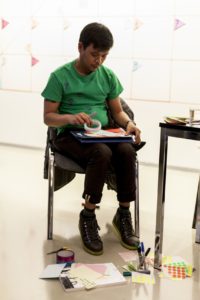
Until May 14th the ifa will provide the rooms in Linienstraße to the collective KUNCI Cultural Studies Center from Yogyakarta. To be exact aus dem Moore herself is only a guest in her own institution during this time. However, why does a gallery turn into a radio station? Because of “Numpang“. The word with the happy sound designates an Indonesian praxis of sharing room, place and time. This can refer to a lift, a temporary shelter or the usage of public room. It always includes an activity that demands the consent of others. In the best case both sides profit in a way that could not be predicted before. “A sensitive exchange of not only money, but also time and jovialty“, explains Syafiatudina, facilitator of KUNCI. Numpang has now made its way to Berlin, where Syafiatudina invited Philip Horst from the centre of art and urbanism (ZK/U) in Berlin and the urban researcher Sinthujan Varatharajah, a representative of the Europe-wide “Initiative Refugees Welcome“ to a program of the online radio KUNCI.
Collective of Mavericks
At the beginning Syafiatudina introduced the collective KUNCI, an association of artists, writers and thinkers that had started as a students´ initiative in 1999. She explained: “Our goal is to create a critical society“. KUNCI is always blamed to stand in between art and science. “We enjoy switching between the domains and to lateral think about some topics“, explains the Indonesian curator.
Another collective is ZK/U that opened in the former good station Moabit in 2012. It followed the artists’ collective KUNSTrePUBLIK. Thanks to leasehold it was possible to open a long-term location for public events and research residences. The goods station now serves as a reloading point of contemporary post-industrial values. There is a common cooking day for example, when artists introduce their projects and once a month there is an open day. Yet, the more institutional the ZK/U has become, the more necessary are regulations especially regarding tidiness and the protection of individual property, admitted Horst. Currently the ZK/U participates in the initiative “House of Statistics“ at Alexanderplatz. Besides artist workshops, affordable apartments and refugee shelters a centre for culture and education is supposed to be established here in the middle of the city. The House of Statistics, former domicile of the “Gauck-agency”, has been vacant for eight years.
Refugees Welcome
The project “Initiative Flüchtlinge Willkommen“ (initiative refugees welcome) addresses living together with refugees. Via a digital platform rooms in shared flats are conveyed to people who lost their home. “For us the thought of traumatized refugees living isolated in former prisons, military buildings and hospitals is unbearable“, explains Sinthujan Varatharajah. “We bring them into society“. He is one of nine employees of the initiative that is already represented in 21 cities. All in all 300 rooms have been conveyed, whereas the demand is the highest in the countries the refugees want to live in. Poland and Greece are the both least demanded of those. The inhabitants of the shared flats as well as the refugees can register and share their notions. Occasionally that takes absurd forms, naturally you can´t “ design your own refugee“, overall the project appears to be successful though.
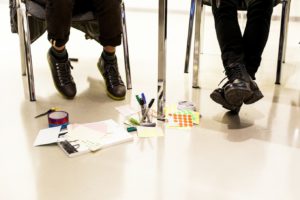
Is the once split city Berlin becoming a city of publically donated sharing? The discussion around Numpang allows sight of new and forgotten own methods of sharing. It will be comprehensible for a long time since Ferdiansyah Thajib from Kunci takes notes while the guests are discussing. He pins the notes to spanned strings on the wall to document the process of Berlin’s Numpang. Meanwhile it’s an important contribution to the “Lange Nacht der Ideen“ (“long night of ideas“) -initiated by the department of state – that took place everywhere in Berlin on April 14th. It was part of the forum “Menschen bewegen“ (“Move people“).
“It is important to connect people – in excess of our gallery“, explained Alya Sebti, the new directress of the ifa-gallery Berlin. Numpang is a kick-off in her spirit. “There is no translation for Numpang“, decided Elke aus dem Moore at the end of the event, „but maybe that´s a good thing. Maybe a society can profit especially from those things that need some effort to be translated.“
The full discussion can be heard in Radio KUNCI.
Fotos: Victoria Tomaschko

